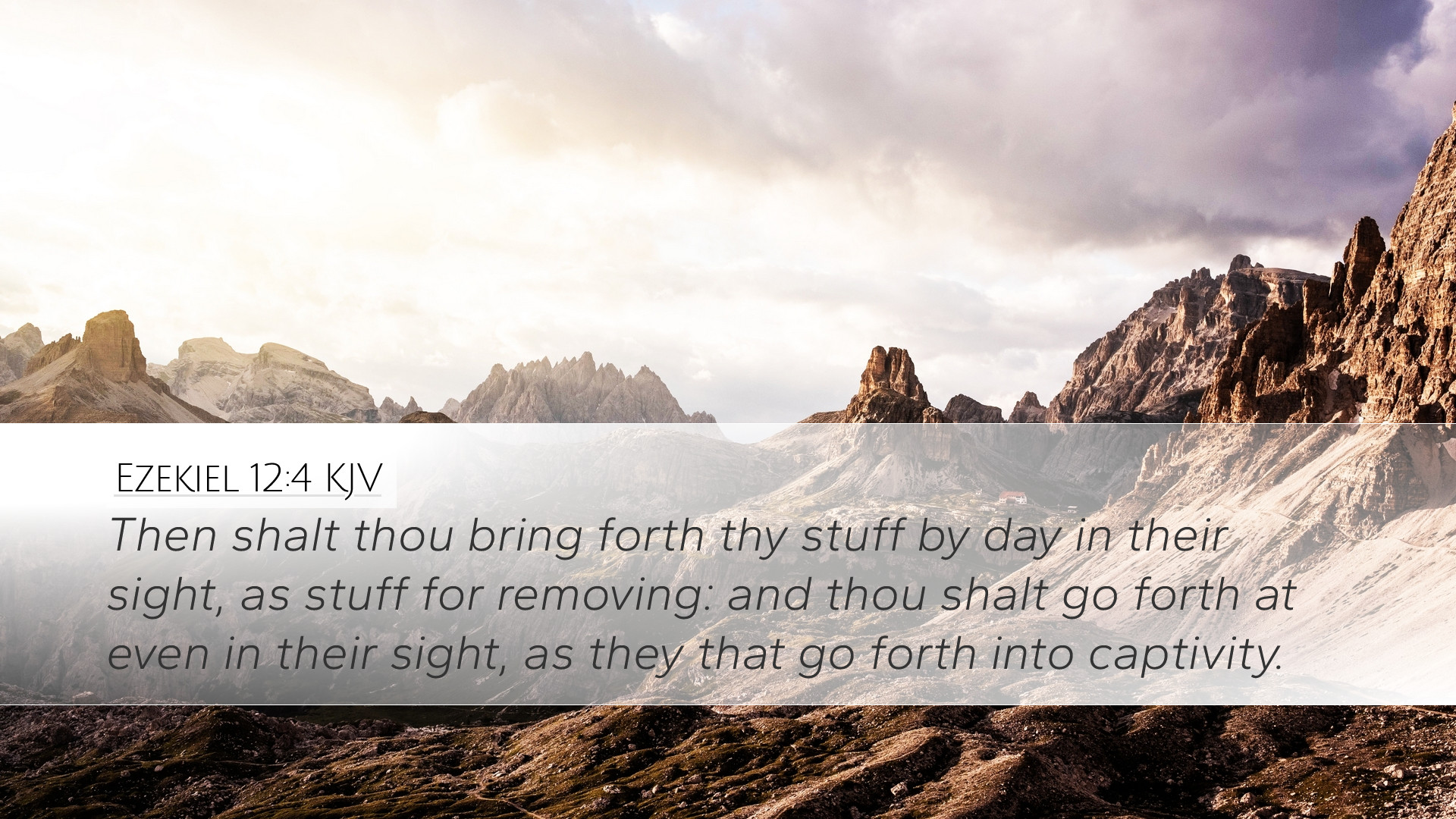Bible Commentary on Ezekiel 12:4
Ezekiel 12:4: "Then shalt thou bring out thy stuff by day in their sight, as stuff for captivity: and thou shalt go forth at even in their sight, as they that go forth into captivity."
Introduction
The book of Ezekiel is rich in prophetic messages and symbolic actions. In Ezekiel 12:4, we see a poignant demonstration meant to communicate profound truths to the people of Israel concerning their impending exile. This commentary synthesizes insights from several public domain commentators, including Matthew Henry, Albert Barnes, and Adam Clarke, to aid pastors, students, and scholars in exploring the layers of meaning present in this verse.
Historical Context
During the time of Ezekiel’s ministry, Jerusalem was under siege, and the threat of Babylonian captivity loomed large over the people. Ezekiel was called by God to deliver messages that not only warned of impending judgment but also offered hope for future restoration. Ezekiel 12, in particular, employs symbolic actions that illustrate the realities of captivity and the urgency to respond to God's warnings.
Verse Analysis
The directive to "bring out thy stuff by day" can be viewed as a dramatic portrayal of the exile. The very act of packing and thereby acknowledging impending captivity serves as a prophetic symbol of the hopelessness the people would soon face.
As Matthew Henry notes, this action was visibly symbolic, showcasing the necessity for the Israelites to recognize and accept their plight. The imagery of "stuff for captivity" resonates deeply as it embodies the loss of security and stability that captivity brings.
Key Themes and Insights
-
The Symbolism of Actions:
Albert Barnes emphasizes that the prophet's actions serve as a vivid testament to the judgment about to befall Israel. Actions often speak louder than words in prophetic literature, and Ezekiel's obedience to God’s command illustrates the seriousness of the message he conveyed.
-
Awareness and Acceptance:
The call to act “in their sight” underscores the need for the people to be attentive and aware of their circumstances. Adam Clarke suggests that in performing these actions publicly, Ezekiel intended to provoke reflection among his fellow citizens regarding their sins and the dire consequences.
-
The Urgency of Repentance:
Understanding the gravity of their situation, there is an implicit call for the Israelites to repent and return to God. The act of preparing for exile symbolized the necessity of recognizing their rebellion and the need for divine intervention.
Pastoral Application
For pastors and church leaders today, Ezekiel 12:4 serves as a reminder of the importance of prophetic voices within the community. Just as Ezekiel's actions were meant to wake the people from their complacency, leaders are called to proclaim truth in ways that foster awareness and catalyze transformation.
Furthermore, the theme of preparation for what lies ahead speaks profoundly to the condition of people today. Believers are encouraged to examine their lives regularly and prepare their hearts for God’s work amidst trials and changes.
Theological Reflections
Ezekiel 12:4 opens avenues for rich theological reflection, particularly concerning judgment and mercy. The symbolism of exile, while daunting, also points toward the possibility of restoration. The prophetic narrative in Ezekiel consistently oscillates between warning and hope, portraying a God who is just yet merciful.
As Clarke highlights, the vivid actions emphasize God’s desire for His people to understand the seriousness of their situation while also indicating the divine presence even in the midst of judgment.
Conclusion
Ezekiel 12:4 encapsulates a moment of prophetic urgency that transcends time. It challenges readers to engage deeply with their faith and recognize the implications of their actions in light of God's truth. The commentaries of Henry, Barnes, and Clarke provide vital insights that shape our understanding and application of this verse, urging both individual and corporate reflection on the call to heed God’s word.


